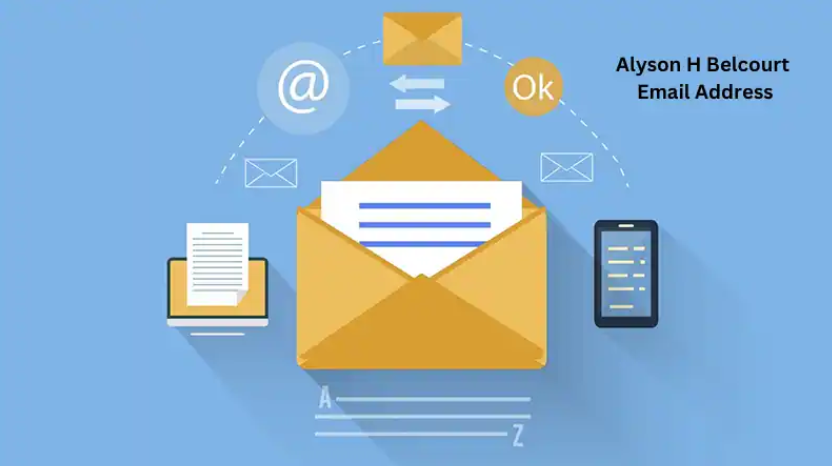In today’s digital age, email communication has become an integral part of both personal and professional life. While it’s natural to want to connect with individuals, there are boundaries that must be respected, especially when dealing with private information like personal email addresses. The subject of “Alyson H. Belcourt email address” reflects a growing interest in individuals’ digital identities, but it also raises questions about privacy, ethics, and the appropriate ways to connect with someone.
This article explores the broader context surrounding Alyson H. Belcourt, why someone might seek her email address, and the ethical considerations of accessing personal information in the digital age.
Who Is Alyson H. Belcourt?
Alyson H. Belcourt is not a widely recognized public figure, but searches for her name may stem from professional or personal interests. Here are a few potential reasons why her name might appear in searches:
- Professional Connections
Alyson H. Belcourt could be a professional in a specific field, such as academia, technology, or business. Individuals seeking her email address may want to collaborate, network, or inquire about her expertise. - Public Contributions
If she has contributed to public projects, written papers, or been involved in notable initiatives, this could explain why people are interested in reaching out to her. - Personal Relationships
In some cases, individuals might look for contact information for personal reasons, such as reconnecting with an old friend or family member.
It’s important to remember that regardless of the reason, accessing someone’s personal email address should be done respectfully and ethically.
The Importance of Email Privacy
In a world where digital communication is paramount, email addresses serve as a gateway to both personal and professional spheres. Protecting email privacy is crucial for several reasons:
1. Prevention of Spam and Unsolicited Messages
Sharing or obtaining email addresses without consent can lead to spam or unsolicited communication, which can be both annoying and invasive.
2. Protection Against Cyber Threats
Email addresses are often targeted in phishing attacks or scams. Ensuring their confidentiality helps reduce exposure to potential cyber threats.
3. Preservation of Personal Boundaries
Respecting someone’s privacy fosters trust and ensures that communication remains mutually consensual.
How to Ethically Obtain an Email Address
If you are looking to contact someone, such as Alyson H. Belcourt, it’s essential to follow ethical practices. Here are the appropriate steps to take:
1. Search Publicly Available Information
Start by checking professional platforms like LinkedIn, company websites, or academic directories. Many professionals provide their contact details on these platforms.
2. Use Professional Channels
If Alyson H. Belcourt is associated with an organization or institution, reach out through official communication channels. This approach is transparent and professional.
3. Seek Permission
If you know someone who has her contact information, ask for permission before obtaining or using it.
4. Utilize Social Media
Platforms like Twitter or Instagram might offer ways to connect with her through direct messaging. However, keep the communication professional and respectful.
5. Respect Non-Response
If your attempts to contact her are unsuccessful, respect her decision not to engage. Persistence beyond reasonable efforts can be perceived as intrusive.
Ethical Considerations When Seeking Contact Information
When pursuing someone’s contact information, it’s vital to consider the ethical implications of your actions.
1. Intent Matters
Why are you seeking Alyson H. Belcourt’s email address? Is it for a legitimate, respectful purpose, or could it be perceived as invasive? Clarify your intent before proceeding.
2. Consent Is Key
Always prioritize obtaining consent. Reaching out without permission can lead to discomfort or mistrust.
3. Avoid Sharing Information
If you come across someone’s email address, refrain from sharing it with others without explicit consent.
4. Adhere to Privacy Laws
Many countries have laws protecting personal information. Ensure your actions comply with regulations such as GDPR (General Data Protection Regulation) or CCPA (California Consumer Privacy Act).
The Role of Technology in Privacy Breaches
1. Data Mining and Aggregators
Many websites compile personal information from various sources, making email addresses accessible without consent. While these tools exist, using them raises significant ethical concerns.
2. Social Engineering
Cybercriminals often use deceptive tactics to obtain personal information. It’s crucial to recognize and avoid such methods to maintain ethical standards.
3. Awareness and Education
Individuals like Alyson H. Belcourt can protect themselves by understanding how to safeguard their digital identities. This includes using strong passwords, enabling two-factor authentication, and being cautious about sharing personal information online.
Best Practices for Protecting Your Email Address
To avoid becoming the subject of unwanted searches or communication, individuals can take proactive steps to safeguard their email addresses:
1. Use Multiple Email Addresses
Separate personal and professional emails to maintain privacy and reduce spam.
2. Avoid Posting Publicly
Refrain from sharing your email address on public forums or social media platforms.
3. Enable Spam Filters
Use email providers with robust spam filtering to block unsolicited messages.
4. Monitor Your Digital Footprint
Regularly search your name online to identify and address any potential privacy breaches.
5. Use Disposable Email Addresses
For temporary communication needs, consider using disposable email addresses.
Legal Frameworks Supporting Email Privacy
Numerous laws protect individuals from unauthorized use of their contact information:
1. GDPR (General Data Protection Regulation)
Enacted in the European Union, GDPR mandates that personal information, including email addresses, cannot be collected or used without consent.
2. CCPA (California Consumer Privacy Act)
In the United States, CCPA provides residents of California with rights to know, delete, or opt out of the sale of their personal information.
3. CAN-SPAM Act
This U.S. law regulates commercial emails, requiring senders to provide a way for recipients to opt out of future communications.
4. PECR (Privacy and Electronic Communications Regulations)
Applicable in the UK, PECR focuses on electronic communications, ensuring that individuals are not targeted without permission.
Understanding and adhering to these legal frameworks is essential when seeking someone’s contact information.
Conclusion
The search for Alyson H. Belcourt’s email address underscores the importance of balancing the desire to connect with others and respecting their privacy. While email communication is a powerful tool, it must be used responsibly and ethically.
By following best practices, adhering to privacy laws, and prioritizing consent, individuals can maintain their integrity while fostering meaningful connections. Whether your interest in Alyson H. Belcourt stems from professional or personal curiosity, always approach the situation with respect and mindfulness.
Would you like further insights on digital privacy or professional networking? Let me know!




